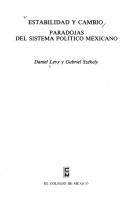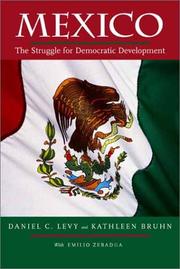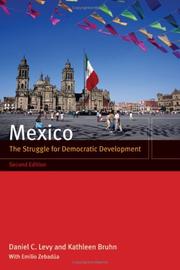Book
ISBN: 0198903553 0198903537 Year: 2024 Publisher: Oxford : Oxford University Press,
Abstract | Keywords | Export | Availability | Bookmark
 Loading...
Loading...Choose an application
- Reference Manager
- EndNote
- RefWorks (Direct export to RefWorks)
'A World of Private Higher Education' is the definitive treatment of a sector accounting for a third of the world's 200 million higher education enrolment - yet remaining largely unknown even to scholars of higher education and widely mis-characterized when it is considered by stakeholders or the general public. Beyond the eye-popping numbers, several inter-related thematic findings regarding the Private and the Public underscore the subject matter's importance.
Private universities and colleges. --- Education, Higher --- Education. --- Economic aspects.

ISBN: 9681203046 6076286059 Year: 1985 Publisher: El Colegio de México
Abstract | Keywords | Export | Availability | Bookmark
 Loading...
Loading...Choose an application
- Reference Manager
- EndNote
- RefWorks (Direct export to RefWorks)
El propósito de esta obra es presentar un análisis de todo lo ocurrido desde diciembre de 1982, fecha de la toma de poder del presidente Miguel de la Madrid resaltando algunos hechos que demuestran que las paradojas y el debate entre la estabilidad y el cambio aún caracterizan dramáticamente el México actual
Politics and government --- Mexico. --- Mexico --- Relaciones exteriores. --- Política económica --- Anáhuac --- Estados Unidos Mexicanos --- Maxico --- Méjico --- Mekishiko --- Meḳsiḳe --- Meksiko --- Meksyk --- Messico --- Mexique (Country) --- República Mexicana --- Stany Zjednoczone Meksyku --- United Mexican States --- United States of Mexico --- מקסיקו --- メキシコ --- History of the Americas

ISBN: 0520228316 0520228081 Year: 2001 Publisher: Berkeley, Calif. University of California Press
Abstract | Keywords | Export | Availability | Bookmark
 Loading...
Loading...Choose an application
- Reference Manager
- EndNote
- RefWorks (Direct export to RefWorks)
International relations. Foreign policy --- Internal politics --- Mexico --- Democracy --- Démocratie --- Mexique --- Politics and government --- Politique et gouvernement --- Démocratie

ISBN: 0520932617 1282358979 9786612358975 1598758055 9780520932616 1423731352 9781423731351 9780520246942 0520246942 9781282358973 6612358971 9781598758054 Year: 2006 Publisher: Berkeley : University of California Press,
Abstract | Keywords | Export | Availability | Bookmark
 Loading...
Loading...Choose an application
- Reference Manager
- EndNote
- RefWorks (Direct export to RefWorks)
This engaging book provides a broad and accessible analysis of Mexico's contemporary struggle for democratic development. Now completely revised, it brings up to date issues ranging from electoral reform and accountability to drug trafficking, migration, and NAFTA. It also considers the rapidly changing role of Mexico's mass and elite groups, and its national institutions, including the media, the military, and the Church.
Democracy --- Mexico --- Politics and government --- alamo. --- antonio lopez de santa anna. --- aztec. --- carlos salinas. --- catholic church. --- colonialism. --- conquest. --- conquistadores. --- cortes. --- democracy. --- drug trafficking. --- electoral reform. --- empire. --- ernesto zedillo. --- ethnicity. --- government. --- history. --- imperialism. --- indigenous culture. --- indigenous people. --- jose maria morelos. --- la reforma. --- media. --- mexican history. --- mexican independence. --- mexican revolution. --- mexico. --- migration. --- miguel hidalgo. --- military. --- modern mexico. --- nafta. --- nonfiction. --- politics. --- porfiriato. --- social change. --- spain.

ISBN: 1280812397 9786610812394 9087901038 9077874089 9077874593 Year: 2005 Publisher: Rotterdam ; Taipei : Sense Publishers,
Abstract | Keywords | Export | Availability | Bookmark
 Loading...
Loading...Choose an application
- Reference Manager
- EndNote
- RefWorks (Direct export to RefWorks)
Several decades ago, private higher education already ranked as a major force in the higher education realm in many countries. Expansion in Latin America had begun in the 1960s, and the private sector was dominant in several key East Asian nations. At that stage, the forces shaping higher education were relatively stable. Then, in the last quarter of the 20th century, the dynamics changed dramatically, and private higher education has suddenly become the fastest-growing segment of higher education worldwide-expanding rapidly in almost all parts of the world. This book helps to highlight trends and realities of private higher education around the world. We have organized the book into two sections. The first deals with international trends and issues, while the second-much longer-section focuses on countries and regions. The majorityof the book’s chapters concentrate on single countries. Authors have written from their own points of view. Some are critical of private higher education development, others express praise, whereas most offer objective observation and analysis. All are united in the belief that this phenomenon is a centrally important aspect of higher education-and one that will continue to expand.
Book

ISBN: 9781685858452 1685858457 Year: 2023 Publisher: Boulder
Abstract | Keywords | Export | Availability | Bookmark
 Loading...
Loading...Choose an application
- Reference Manager
- EndNote
- RefWorks (Direct export to RefWorks)
Presents case studies of experiences with democracy in Asia, Africa, Latin America, and the Middle East, along with the editors' synthesis of the factors that facilitate and obstruct the development of democracy around the world.
Book

ISBN: 9781685851941 1685851940 Year: 2023 Publisher: Boulder
Abstract | Keywords | Export | Availability | Bookmark
 Loading...
Loading...Choose an application
- Reference Manager
- EndNote
- RefWorks (Direct export to RefWorks)
Extensively revised since the first edition was published in 1989, this analytically balanced and empirically rich volume thoroughly examines the historical, cultural, social, economic, political, and international factors that affect both the prospects for and the nature of political democracy in Latin America. The book reflects improvements in democratic trends in some countries, but also the erosion of democratic advances in others, with substantial malaise regarding key political actors and institutions and continuing concerns about the impact on democratic consolidation of economic constraints, weak states, judicial inefficacy, and high degrees of inequality. A comprehensive introduction precedes the nine country chapters, which follow a similar format to facilitate comparisons.
Book

ISBN: 9781685853112 1685853110 Year: 2023 Publisher: Boulder
Abstract | Keywords | Export | Availability | Bookmark
 Loading...
Loading...Choose an application
- Reference Manager
- EndNote
- RefWorks (Direct export to RefWorks)
Following a common analytical framework, the authors trace the experiences with democratic and authoritarian rule and assess the underlying causes of democratic success and failure in ten Latin American countries.
Book

ISBN: 9781685853150 1685853153 Year: 2023 Publisher: Boulder
Abstract | Keywords | Export | Availability | Bookmark
 Loading...
Loading...Choose an application
- Reference Manager
- EndNote
- RefWorks (Direct export to RefWorks)
Ten country studies (three from Latin America, one from the Middle East, three from Asia, and three from Africa) follow a common analytical framework to trace experiences with democratic and authoritarian rule and assess the underlying causes of democratic success and failure.
Multi

ISBN: 9781685851941 9781555877989 Year: 2023 Publisher: Boulder Lynne Rienner Publishers
Abstract | Keywords | Export | Availability | Bookmark
 Loading...
Loading...Choose an application
- Reference Manager
- EndNote
- RefWorks (Direct export to RefWorks)

 Search
Search Feedback
Feedback About UniCat
About UniCat  Help
Help News
News